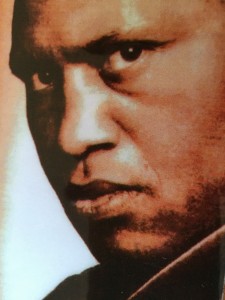If Richard Durham were alive today, he would no doubt take time to honor the life of Paul Robeson – the gifted African American athlete, committed scholar, talented artist and inspiring activist born on April 9th.
During his lifetime (1898-1976), the 6 foot 3 inch tall, deep-voiced Robeson attained worldwide celebrity. Yet despite his substantial achievements as a singer and star of stage and screen, Robeson was a selfless champion of the battle for global human rights. Robeson was praised and damned for his outspoken activism and dedication to social justice.
So Durham proposed dramatizing Robeson’s life in Destination Freedom, Durham’s award-winning and truly unique series about African American heroes and heroines. This half-hour long, weekly radio series aired on NBC affiliate station WMAQ in Chicago, from 1948-50. But Robeson’s progressive views and activism were too radical for the network’s taste. According to Durham:
I wasn’t as unhappy with not being allowed to put Paul Robeson on because frankly, I didn’t think that I could get it done. Some subjects have more electricity than others by virtue of the fact that people know about them or have already established a certain outlook on them.
Still, Durham found ways to portray the lives and contributions of men and women whose outspokenness mirrored Robeson’s. One such person was Denmark Vesey. A former South Carolina-based slave, Vesey masterminded a revolt that reportedly involved about nine thousand co-conspirators in 1822.
Denmark Vesey’s revolt was foiled before it gained traction. But at his trial before a South Carolina judge and angry white spectators, Durham’s Vesey character delivered a speech that was “one of the most damning critiques of racial abuse ever heard on U.S. radio,” historian J. Fred MacDonald asserted.
This episode’s judge character asked Denmark Vesey to explain his act of “treachery” against the state of South Carolina.
Durham’s Vesey replied:
My treachery began when I read the Declaration of Independence…
it said “All men are created equal.” It grew when I read that black
Crispus Attucks died to help the colonies be free.
Did he die just to free white men or all men?
Then I read what Ben Franklin, Tom Paine, LaFayette and Jefferson had said
and their words warmed my blood. They wanted their revolution to make all men free and equal. They stopped with some men free and some men slaves.
I took up where they left off.
(Slower.) I found my price when I was a slave and I paid it. If my life is the price I pay to be free… take it. I’ll pay it.
Until all men are free, the revolution goes on!
